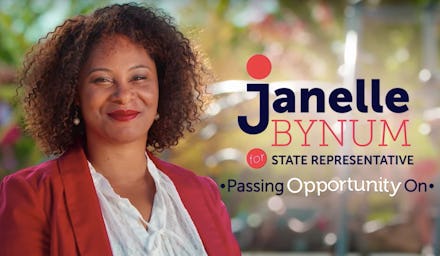Black legislator gets police called on her while canvassing her own district on Fourth of July eve

Oregon state Rep. Janelle Bynum (D-51) was canvassing a Clackamas, Oregon, neighborhood she represents Tuesday when a Clackamas County Sheriff’s deputy pulled up and asked if she was “selling something,” OregonLive reported.
“I don’t believe this,” Bynum recalled thinking, according to the outlet. It was around 5:10 p.m. The black, 43-year-old legislator had spent the past two hours knocking on almost 30 doors in the Portland suburb, talking face-to-face with her constituents in advance of the upcoming November election.
The deputy told Bynum someone had called 911 on her. The caller reportedly told dispatchers a woman was spending a long time at houses along Southeast 125th Avenue, and appeared to be “casing” them, taking notes on her cellphone.
Bynum quickly cleared things up with the deputy — whom she described to OregonLive as “courteous and professional” — and told him that she was a state legislator and kept notes on her phone about people she spoke to.
“When people do things like this [calling 911 erroneously], it can be dangerous for people like me,” she recalled telling him, according to OregonLive. Bynum did not immediately respond to Mic’s request for comment.
Tuesday’s incident takes on added significance in light of current events. On Saturday, neighboring Portland — an eastern section of which Bynum also represents — played host to a violent gathering of Patriot Prayer, a far-right activist group with whom members of white nationalist organizations like Identity Evropa and the Traditionalist Worker Party have marched, according to the Southern Poverty Law Center.
The following Thursday also marks 166 years since slave-turned-abolitionist Frederick Douglass made his famous Fourth of July speech to a gathering of people in New York in 1852.
“What, to the American slave, is your Fourth of July?” Douglass asked. “I answer: a day that reveals to him, more than all other days in the year, the gross injustice and cruelty to which he is the constant victim.”
Douglass’ speech and Saturday’s rally highlight the deceptively short distance American race relations have come since the antebellum period. Then, blacks could not fully participate in Independence Day because they were enslaved. The holiday still has an enduringly complicated nature today, when a black lawmaker is perceived by her own constituents as a would-be criminal for trying to earn their vote, while far-right protesters gather mere miles away.
More pointedly, Tuesday’s incident marks yet another example of mostly white Americans using police involvement — or the threat thereof — to regulate harmless black behavior. Recent antagonists who have gone viral include the white woman in Oakland, California, who called police on black men for having a barbecue in a public park and Alison Ettel, the white San Francisco cannabis entrepreneur who threatened, and then pretended to call police on, an 8-year-old black girl for selling water “without a permit.”
These calls have sparked nationwide debate and hashtags, as has Randy Krakora, a white man who called police on black 12-year-old Reggie Fields for inadvertently crossing onto his property while mowing Krakora’s neighbor’s lawn in Maple Heights, Ohio, in June. For many, these individuals have encapsulated the frayed relationships between black and white neighbors, and how white people often address this disconnect by summoning armed reinforcements.
The cost of the resulting interactions can be deadly. According to the Washington Post, black people have been almost one-fifth of fatal police shooting victims in 2018 so far, despite being just 13% of the national population. White fatal police shooting victims, on the other hand, constitute 40% of the total, despite white people being more than 76% of the population.
Rep. Bynum does not know the race of the person who called police on her Tuesday, according to OregonLive. But she was able to convince the deputy to let her speak to them by phone. The caller — a local woman who reportedly wouldn’t say what house she lived in — apologized to Bynum and said she only made the call out of concern for neighborhood safety.
Bynum would have preferred that the caller just talk to her directly, or simply ask a neighbor what was going on.
“We all know that we’re not in a society that is perfect, and we have wounds that still need to heal,” Bynum told OregonLive, “but at the end of the day, I want to know my kids can walk down the street without fear.”